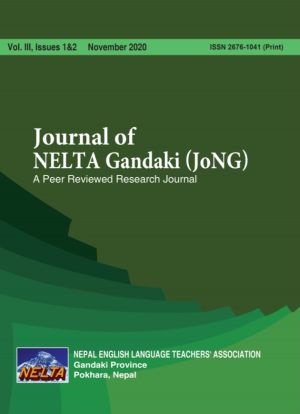Sanjeev Upreti’s Hansa: An Ecocritical Quest
DOI:
https://doi.org/10.3126/jong.v3i1-2.33155Keywords:
anthropocentrism, ecocriticism, transcendentalism, narrative epistemology, romanticismAbstract
This article explores the idea of symbiosis; the notion of survival and letting nature and other organisms survive. The idea of 'back to nature' has been explored in the novel through the role of Anuj Pandey who makes a journey from East to West at first and from West to East in the end. Prem represents local citizen whereas Anuj Pandey attempts to look cosmopolitan. However, Anuj Pandey’s mission fails. The novelist assumes a person cannot be a true transcendentalist unless he/she experiences materialism through senses. In order to make a true flight, a person needs to move from the world of human to the world of nature. This all is possible through the activation of the sixth sense. The novel depicts the problems of both local and global homes. The locals desire to fly in the global and again the globalized ones desire to fly somewhere else. The novel shows that they intend to fly beyond anthropocentric world which is neither local nor global, but it is the world that is ruled or governed by the presence of nature. A person may feel as a complete man only in the vastness of nature. The article brings theoretical insights from romanticism, transcendentalism, narrative epistemology, anthropocentrism, ecocriticism and biocentrism as the tool or method of analysis.
Downloads
Downloads
Published
How to Cite
Issue
Section
License
This license allows reusers to distribute, remix, adapt, and build upon the material in any medium or format for noncommercial purposes only, and only so long as attribution is given to the creator.




